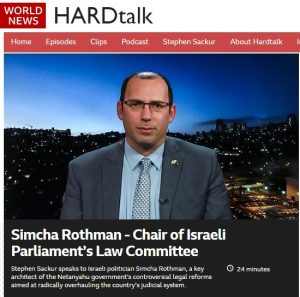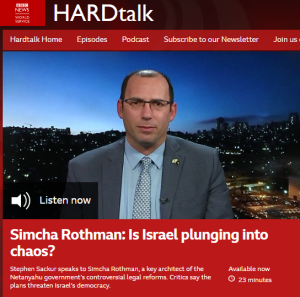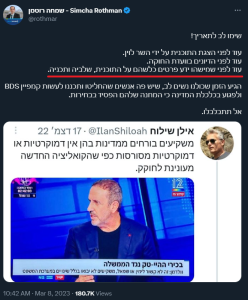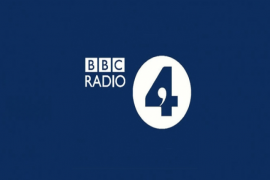The March 10th editions of the BBC programme ‘Hardtalk’ featured Simcha Rothman who is currently the chair of the Knesset’s Constitution, Law and Justice Committee.
[televised version here, radio version here]
“Stephen Sackur speaks to Israeli politician Simcha Rothman, a key architect of the Netanyahu government’s controversial legal reforms aimed at radically overhauling the country’s judicial system. Critics say the plans threaten Israel’s democracy. This, alongside the rising violence in the occupied West Bank, raises questions about the strategic direction of Netanyahu’s ultra-nationalist government. Is Israel plunging into chaos?”
Clearly the majority of viewers and listeners worldwide would have little if any prior knowledge of the main topic under discussion and so clarifications from the presenter Stephen Sackur would be of prime importance in such an interview in order for audiences to gain some understanding of the issue.
However on a number of points, adequate clarifications were not provided.
In response to Sackur’s opening question Rothman replied: [emphasis in italics in the original, emphasis in bold added]
02:12 Rothman: “I’m trying to make Israeli judiciary be more independent from the pressures it’s currently have. More…appointed in a way that’s more democratic, like most other countries in the world that elect their judges through the democratical [sic] system and after the judges are elected or selected, they are independent. That’s the way it works in most democratic countries around the world and that’s the way it should work in Israel. In Israel we have a very strange system where the judiciary basically self-perpetuates, self-elects itself, has a veto who’ll get in and that’s created an ever-growing distance between the public in Israel and the judges.” [emphasis added]
The Judicial Selection Committee chooses judges to be appointed by the president to the different courts according to the Basic Law – Judiciary (which was of course passed by the Knesset). The committee, which is made up of nine members, is chaired by the Minister of Justice. Additional members of the committee are another minister from the cabinet, two members of the Knesset (usually but not necessarily one from the coalition and one from the opposition), the president of the Supreme Court, two additional judges from the Supreme Court and two members of the Bar Association.
In other words, the committee is made up of four politicians, three judges and two lawyers.
The appointment of a judge to the district or magistrates’ courts requires a majority of five of the nine committee members. The appointment of a judge to the Supreme Court requires a majority of seven of the nine committee members, meaning that the two government ministers and at least one Knesset member from the coalition can together actually block an appointment to the Supreme Court.
The claim that the judiciary “self-elects” and “has a veto” is hence inaccurate and misleading but Stephen Sackur did not provide any clarification of the current system in order to inform audiences and enable them to put Rothman’s inaccurate claims into their appropriate context.
Rothman went on to claim that:
03:59 Rothman: “Most Israelis that voted in the election voted for exactly those reforms that were well detailed before the elections by my party, by the Likud party, by the other parties in the coalition. It was very clear the majority of the public in Israel voted on.”
The claim that the proposals were a “well detailed” part of the election campaign has become a popular talking point among their supporters. However in the run-up to the election the Likud did not provide the electorate with any detailed explanation of the proposals as they are now being advanced and indeed some members of the coalition have more recently claimed that the topic has not been adequately explained to the public. Rothman’s own party (Religious Zionism, which won 14 seats) did publish outlines of the proposals before the election, such as the two-minute video in Rothman’s pinned Tweet.
Two days before this BBC interview, Rothman himself posted a Tweet in which he referred to the date December 17th 2022 as “before anyone knew any details of the plan, its stages and its content”.
Stephen Sackur however did not challenge that misleading claim from Rothman who continued:
Rothman: “It’s true that some people don’t like it. But to say that the majority of the public in Israel do not support to change the way we select our judges or other issues that’s…I don’t know where you draw this conclusion…”
Sackur responded by referring to opinion polls, including one by the Israel Democracy Institute which shows that two-thirds of the Israeli public oppose the proposals and 44% of those who voted for parties that now make up the coalition oppose key parts of the measures.
Rothman dismissed that with the claim that the IDI is “very much involved in the working against…is not an independent…” and went on to assert once again that among the parties that now make up the coalition “this was a key to their agenda before the election”.
Sackur at that point shifted the focus of the conversation to the topic of the ongoing popular protests and so BBC audiences were left with inaccurate impressions on the topic of public opposition to the proposals.
In response to a survey carried out by Israel’s N12 channel, 54% of Likud voters said that they did not know when they cast their ballot that the government was planning “a significant reform of the judicial system” and 60% of those polled disagreed with Simcha Rothman that the proposals are “the will of the people”. Prior polls, including the one cited by Sackur but dismissed by Rothman, have presented a similar picture.
Clearly audience understanding of the complex topic of this interview was hampered by the failure to provide adequate clarification and challenge to misleading aspects of the interviewee’s claims.




